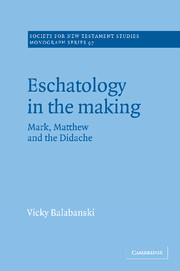Book contents
- Frontmatter
- Contents
- Preface
- List of abbreviations and note on texts
- Introduction
- 1 An imminent End? Models for understanding eschatological development in the first century
- 2 Matthew 25:1–13 as a window on eschatological change
- 3 Mark 13: eschatological expectation and the Jewish War
- 4 The Judean flight oracle (Mark 13:14ff) and the Pella flight tradition
- 5 Matthew 24: eschatological expectation after the Jewish War
- 6 Didache 16 as a development in Christian eschatology
- Conclusion
- Bibliography
- Index of modern authors
- Index of biblical and other ancient texts
- Subject index
Conclusion
Published online by Cambridge University Press: 04 September 2009
- Frontmatter
- Contents
- Preface
- List of abbreviations and note on texts
- Introduction
- 1 An imminent End? Models for understanding eschatological development in the first century
- 2 Matthew 25:1–13 as a window on eschatological change
- 3 Mark 13: eschatological expectation and the Jewish War
- 4 The Judean flight oracle (Mark 13:14ff) and the Pella flight tradition
- 5 Matthew 24: eschatological expectation after the Jewish War
- 6 Didache 16 as a development in Christian eschatology
- Conclusion
- Bibliography
- Index of modern authors
- Index of biblical and other ancient texts
- Subject index
Summary
On the basis of these studies of Matthew 25:1–13, Mark 13, Matthew 24 and Didache 16, I am able to conclude that the widely accepted model of progressive ‘de-eschatolization’ in the early church due to the passing of time and the disappointment at the delay of the parousia fits the evidence only partially.
Particularly in Matt. 25:5–7a I discerned the literary deposit of a community coming to terms with the delay of the parousia, a problem that had become acute, owing not so much to the passing of time as to the death of community members. This had led to a reworking of eschatological expectation and an incorporation of the possibility that all may die before the expected parousia into their eschatological framework. I tentatively dated the revision of eschatological expectation within this community to the forties or fifties, but recognized that not every community necessarily under-went such a process at this time. One could not strictly claim that the process reflected in Matt. 25:1–13 was ‘de-eschatolization’, for the reworked expectation retained an imminent parousia-hope while at the same time recognizing the experienced delay. By the time this material was incorporated into Matthew's Gospel, I found that the delay of the parousia was no longer a burning issue, as both the possibility of the death of all Christians and the fact of the delay itself had become part of the revised eschatological framework.
- Type
- Chapter
- Information
- Eschatology in the MakingMark, Matthew and the Didache, pp. 206 - 209Publisher: Cambridge University PressPrint publication year: 1997

